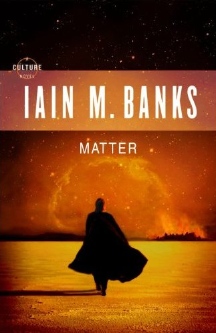 |
 Iain M. Banks
Iain M. Banks
Matter
Reviewed by: Richard Gingell © 2008
Orbit Books / Hachette Book Group
US First Edition Hardcover
ISBN 978-0316005364
608 Pages; $25.99
Publication Date: 02-28-2008
Date Reviewed: 02-17-2008
Index:
Science Fiction
Iain Banks (with or without the “M”) is an inventive, witty
and apparently effortless writer whose words fly off the page; his books
are hard to put down. “Matter” is his 8th SF novel exploring
the “Culture”. For those not familiar with the Culture (and
just where have you been?), the Culture is a post-scarcity society in
which everything one could possibly want is free, and an apparently hedonistic
society in which there are no rules (but if you upset enough people badly
enough, they won’t play with you any more, so there are some self
imposed rules for most “people”). The Culture consists of
(mostly) human-like beings and Minds (autonomous and emancipated AIs
of great power and wisdom). For all its apparent anarchy, the Culture
has a diplomatic arm known as Contact, a subset of which, known as Special
Circumstances, is responsible for rather robust “diplomacy”.
“
Matter” is a story of trust and betrayal, deception hidden within
deception, revenge and redemption, genocide and small victories, of the
insignificant becoming significant, and of good intentions gone bad;
in other words, a typical Iain Banks novel.
The story has two main threads which eventually (and sometimes perhaps
a little too slowly) converge.
In one thread we have Djan Seriy Anaplian, an agent for Special Circumstances
together with Turminder Xuss (drone, offensive) interfering in a war.
Djan comes from the 8th level of the Shellworld Sursamen (imagine a world
consisting of a set of concentric spheres, or a set of Russian dolls,
each level inhabited by a different species). She was sent to the Culture
by her father King Hausk, ruler of Sursamen’s patriarchal 8th level,
as thanks for their help but is now changed, almost beyond recognition,
by the Culture’s technology and genetic manipulation.
In the other thread, several thousand light years away we have Djan’s
two brothers Ferbin and Oramen together with her father the king on their
home world of Sursamen; the king is killed, this thread splits with Ferbin
on the lam and with Oramen unknowingly in deadly danger.
What follows is an exciting romp as we travel through the Sursamen’s
various levels and across the galaxy as Ferbin, together with his man
servant Choubris Holse, seeks help from his sister, Oramen learns of
his danger and Djan attempts to return to Sursamen. At times, this middle
section feels as if it could have done with some tighter editing but
Banks on a bad day is better than most other writers on their good days.
The outcome of that return will not surprise Mr. Banks regular readers
as characters learn to behave honorably and wish for a good death, and
he avoids the conventional happy ending. But wait, there’s an epilog
after the book’s appendix that should at least raise a smile.
So how does this book compare with Mr. Banks other Culture novels? In
two words, very well; not the greatest of his output which would be
either “Consider Phlebas”,
a great rollicking space opera or “The Player of Games” in
which an individual member of the Culture, inveigled into working for
Special Circumstances, is principally responsible for bringing down an “evil
empire”.
|
 |
